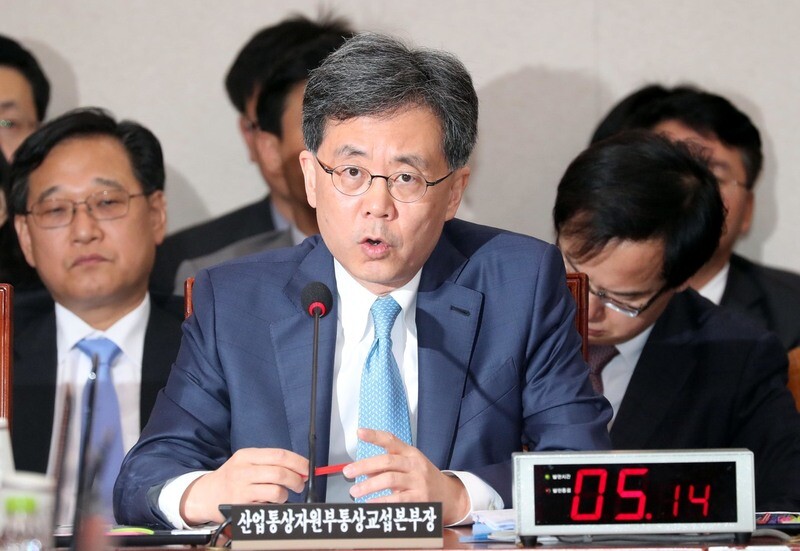hankyoreh
Links to other country sites 다른 나라 사이트 링크
Agricultural sector is “red line” in KORUS FTA negotiations

Trade Minister Kim Hyun-chong said South Korea would “consider all possibilities, including no deal being reached” after agreeing to begin procedures toward amendment of the South Korea-US Free Trade Agreement (KORUS FTA). He also reported “communicating in no uncertain terms to the US that demands for additional openness in the agricultural sector are our ‘red line’ and something completely unacceptable.”
While appearing at a National Assembly audit of the Ministry of Trade, Industry and Energy (MOTIE) on Oct. 13, Kim fielded a question from Democratic Party lawmaker Kwon Chil-seung on whether Seoul was “considering a scenario where KORUS FTA breaks down if the US demands conditions completely unacceptable to us in future amendment negotiations.”
“All negotiations take place with an understanding of the possibility that there may be no deal,” Kim replied.
“The US administration withdrew from the Trans-Pacific Partnership, and now they’ve withdrawn from UNESCO. In the case of KORUS FTA, we see withdrawal as a real and imminent threat,” he said, adding that Seoul had agreed to begin amendment procedures as a way of responding preemptively and lowing Washington’s expectations.
“If the US demands a large-scale package in the amendment negotiations that is absolutely unacceptable and we judge to be humiliating, we will not be able to accept that,” he continued.
“In that case, we expect the US will go on to the next stage. We can’t rule out the possibility that the US will abandon the agreement.”
But Kim also stressed that Seoul would work to ensure that a deal is reached in the negotiations to keep the FTA in place.
“Agriculture is our ‘red line,’ and we’ve communicated in no uncertain terms that we cannot accept US demands for any additional openness there,” he said.
“We expressed that agriculture is the most difficult issue for us, and that the minute they try to touch agriculture, we’re going to touch the items that the US regards most sensitively.”
Regarding the scope and focus of negotiations, Kim said Seoul was “asking Washington to adopt a small package approach to negotiations” rather than full-scale amendment.
“In terms of our demands, we are considering industrial products and amendment of the investor-state dispute (ISD) system,” he added.
Kim was subsequently asked by Democratic Party lawmaker Lee Hoon whether Washington’s focus on adjusting the trade balance meant some unilateral concessions from South Korea were inevitable.
“The US may demand a balancing of trade deficit figures [in the amendment negotiations], or something else symbolic,” Kim replied.
Methods of relieving the deficit “could include shale gas imports or US weapons purchases,” he added.
Meanwhile, Blue House Senior Secretary to the President for Economic Affairs Hong Jang-pyo told reporters the same day that he “finds it very dismaying that some are making baseless claims that the administration made some kind of behind-the-scenes agreement with the US on the KORUS FTA amendment negotiations.”
“In terms of what the two sides agreed upon at the time of the South Korea-US summit on June 30, it’s all in the announced joint statement text, and there was no official or unofficial agreement regarding the FTA,” he added.
By Cho Kye-wan and Jung Yu-gyung, staff reporters
Please direct questions or comments to [english@hani.co.kr]

Editorial・opinion
![[Column] Has Korea, too, crossed the Rubicon on China? [Column] Has Korea, too, crossed the Rubicon on China?](https://flexible.img.hani.co.kr/flexible/normal/500/300/imgdb/original/2024/0419/9317135153409185.jpg) [Column] Has Korea, too, crossed the Rubicon on China?
[Column] Has Korea, too, crossed the Rubicon on China?![[Correspondent’s column] In Japan’s alliance with US, echoes of its past alliances with UK [Correspondent’s column] In Japan’s alliance with US, echoes of its past alliances with UK](https://flexible.img.hani.co.kr/flexible/normal/500/300/imgdb/original/2024/0419/2317135166563519.jpg) [Correspondent’s column] In Japan’s alliance with US, echoes of its past alliances with UK
[Correspondent’s column] In Japan’s alliance with US, echoes of its past alliances with UK- [Editorial] Does Yoon think the Korean public is wrong?
- [Editorial] As it bolsters its alliance with US, Japan must be accountable for past
- [Guest essay] Amending the Constitution is Yoon’s key to leaving office in public’s good graces
- [Editorial] 10 years on, lessons of Sewol tragedy must never be forgotten
- [Column] A death blow to Korea’s prosecutor politics
- [Correspondent’s column] The US and the end of Japanese pacifism
- [Guest essay] How Korea turned its trainee doctors into monsters
- [Guest essay] As someone who helped forge Seoul-Moscow ties, their status today troubles me
Most viewed articles
- 1[Column] The clock is ticking for Korea’s first lady
- 2After 2 months of delayed, denied medical care, Koreans worry worst may be yet to come
- 3Hong Se-hwa, voice for tolerance whose memoir of exile touched a chord, dies at 76
- 4[Column] Has Korea, too, crossed the Rubicon on China?
- 5[Correspondent’s column] In Japan’s alliance with US, echoes of its past alliances with UK
- 6Samsung barricades office as unionized workers strike for better conditions
- 7All eyes on Xiaomi after it pulls off EV that Apple couldn’t
- 8[Editorial] As it bolsters its alliance with US, Japan must be accountable for past
- 9[News analysis] After elections, prosecutorial reform will likely make legislative agenda
- 10US overtakes China as Korea’s top export market, prompting trade sanction jitters